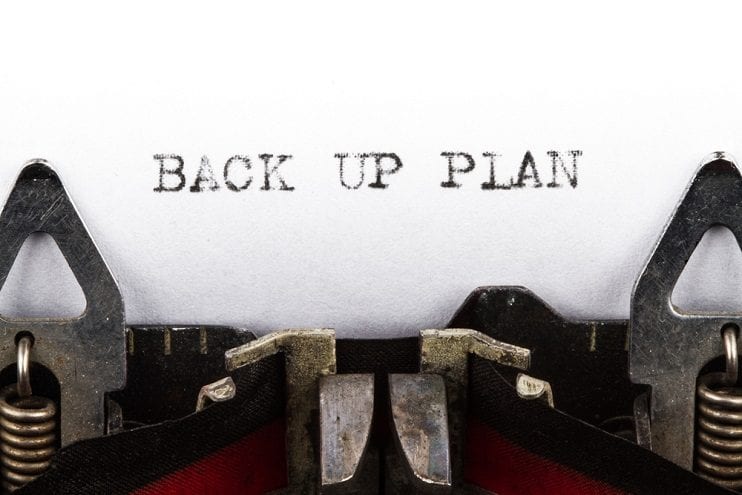Your Personal Backup Plan

A natural disaster destroys more than property. It also destroys financial records and other important documents. Many evacuees from Katrina say that they cannot even prove who they are, because they lost driver’s licenses, passports, birth certificates, and other identification in the hurricane and its aftermath.
The traditional advice is to preserve important documents in a safe deposit box or a fire-proof box at home. But a safe deposit box does little good when the bank is underwater or has been obliterated by category five winds. Likewise, a home security box or safe can disappear or be damaged in such a catastrophe. Ideally, important documents, records, and backed-up computer data are kept in a locked fireproof box that can be carried. But you might not be able to get to the box or take it in an emergency.
Keeping necessary records in such boxes also can be burdensome. After a disaster, you still might need to pay bills, get cash from the bank or ATM, prepare tax returns, and do myriad other tasks. Keeping copies of current bills, tax documents, ATM cards, and other records in a safe deposit box isn’t practical. Electronic records are equally vulnerable. All those records you have conveniently entered into Quicken or Microsoft Money will be gone if they are residing on your hard drive and backup media when they are destroyed by nature.
The good news is that most financial service companies are prepared to help. They generally will suspend late fees and other penalties for those affected by a catastrophe. Many will reduce or suspend payment schedules for a period of time. These companies often view a catastrophe as a way to provide extra service to customers and build their loyalty. Banks and credit card companies will stretch to help customers replace cards, checks, and other essentials as soon as practicable.
Financial service companies and government agencies (such as the IRS) also are able to provide copies of past documents if you need them to rebuild.
The key for you is to prepare a backup system that will reduce the amount of detective work and other digging that must be done to start the rebuilding process.
Electronic records traditionally are backed up to another media and stored. But if your backup media is near your hard drive, the backup also can be lost or destroyed in a catastrophe. The only safe way of using the traditional back up methods is what large businesses do: Have the backup physically transported to a distant location.
You could ship the back up to a distant friend or relative. There are several other ways to preserve electronic records. Some firms offer backup services for consumers and businesses. You upload the files to a password-protected section on the company’s servers. It backs up its own servers and stores archived data in a more secure location. A similar option is to get a web site address and contract with a web hosting company. Set up a secure subdirectory on your “web site” that is not linked to any other web addresses. Give it a meaningless name, such as a string of numbers. You access it only through the use of an ftp software program. Then, your financial files and other data can be stored on the web hosting company’s servers for you to access from any computer in the world.
Try to avoid using a start up or little-known company for these services. After the Internet bust, some companies offering such services closed down literally overnight. They did not arrange to have other companies take over their business, and customers lost all access to the information on the servers.
Electronic backup also can be used for other types of records. Scan important documents to create a computer file. Transfer copies of the files to your secure backup or a portable media. You can download and print them when needed. Perhaps these electronic copies of your identification and other documents could help you rebuild.
You can ensure access to important lists in the same way. For example, create a word processing or spreadsheet file with important information about your credit cards and financial accounts: telephone numbers, account numbers, name of the accounts, passwords, etc. Add this file to your secure backup. You will know whom to call and what to tell them if disaster strikes. Note: Be sure that the original file on your hard drive is protected by a firewall and other measures, or keep it on a CD or other removable storage device that cannot be accessed by Internet pirates.
Electronic access to cash and financial accounts also can be helpful. An ATM card means instant access to cash worldwide. Likewise, online management of bank and financial accounts will allow you to make transactions and generate cash from any computer with Internet access.
Medical records are another important consideration. Many evacuees from Katrina lost their medicine and did not remember the name or dose. If your doctors’ offices are flooded or blown away, your records probably are destroyed.
Ask doctors if they have backup for their records. Most keep paper records and have no backup. Consider asking for a copy of your file and getting an update every year or so. Then, you can create a backup system.
When reviewing your insurance coverage, also review the security of your important records. Taking a few minutes now to provide a reliable backup of important records and data files will make the recovery process much easier.
![]()





